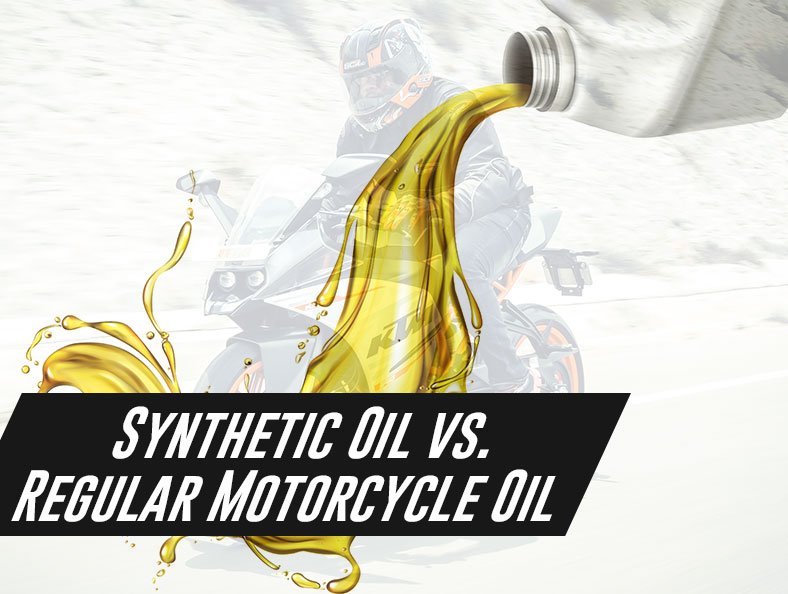Regular Motorcycle Oil vs. Synthetic – Which Do You Need?

Have you changed the oil on your bike already? Regardless of how long you’ve been a biker, you probably know of the great debate between synthetic and regular motorcycle oil.
Interestingly, it’s hard to tell which option is better since many things affect the matter. It depends on the climate you live in, the type of bike you have as well as how often you ride it. While synthetic is almost always a more convenient option, that’s not always the case.
Continue reading if you’re struggling to choose between the two. Below, we’ll discuss both synthetic and conventional oil and what makes them a good choice.
Oil and SAE Ratings Background
Before you choose one between the two, you should learn a little about the viscosity of lubricants and how they’re rated. We use SAE ratings to measure how thick car or motorcycle oil is, so a lower SAE number means it’s thin and flows easier, while a high SAE rating means the opposite.
Naturally, oil gets very hot as the engine is running so it can flow easier. Imagine those that are already quite thin; they’ll become even lighter once hot and might not be enough to protect your motor. For this reason, you should go for those that are 20 W-40 or higher. The rating means that this one flows like a 20-grade when it’s cold, but flows like a 40-grade in hot temperatures.
Avoid those with light SAE ratings as those might be too flowy for your engine and might not be enough to protect it properly.
How Engine Design Helps Determine Oil Type
Newer motorcycles are usually recommended to use synthetic. Still, the choice has more to do with the engine. On the other hand, some manufacturers also recommend standard lubricant for some bikes.
The choice depends on the engine type and its displacement. Lower displacement engines are made with two-stroke and two-cycle engines. Two-stroke engines don’t store the lubricant which is actually continuously burnt off. It keeps running through the engine continuously.
This means that a 2-stroke engine requires continuous adding of small amounts. For this reason, manufacturers recommend standard engine lubricant for 2-stroke engines.
However, 4-stroke bike engines are similar to those in a car. They have a reservoir that stores the oil and cycles it only as it’s needed. This means it will sit in the reservoir for a long time depending on how often you ride the bike.
For this reason, manufacturers suggest synthetic for this type of engine. It doesn’t break down as easily in cooler temperatures or when not being used.
So, it comes down to how often you ride the bike and the type of engine you have. If you’re unaware of what the actual manufacturer of your bike suggests, go with the general rule of thumb. If you have an older 2-stroke engine, you should use regular lubricant. On the other hand, you should use synthetic if you have a 4-stroke motor.

Synthetic vs. Conventional – Which is Better?
This is an ongoing debate, and you’ll hardly find the answer to this question. There are brand loyalties passed down from biker to biker, different arguments and lies told by businesses that affect how people feel about different types.
The truth is that both are good, but it all depends on where you live and how often you ride. Climate considerations are as crucial as the flow rates. If you live in colder temperatures, synthetic is probably the best option for you. Conventional oil has high viscosity and cannot flow below 34 degrees Fahrenheit.
Synthetic flows at -50 degrees Fahrenheit which is ideal for cold climate. It performs equally as well in high temperatures that go up to 400 degrees. Conventional fails at around 270 degrees although this might not matter since bikes rarely pass the 270 mark.
What are Synthetic Great for?
As we said, synthetic is usually the way to go because it’s a bit more versatile and generally easier to use. It’s ideal for those who don’t like changing the lubricant as frequently since you can go up to 5000 miles before you change it.
Synthetic is more suitable for different climate temperatures. It’s ideal for colder weather but can also withstand higher temperatures than regular cannot handle.
This type is also better for those engines that require different lubricants than the one used for the clutch.
Which Should You Use?
In essence, you should use conventional if you live in a country with a mild climate and you’re serious about changing the oil regularly. If you live in an area where it gets as cold in the winter as it gets hot in the summer, you’re probably better off with synthetic.
Frequently Asked Questions
When do you need to change your oil?
You probably heard that you should change the lubricant at every 3000 miles. While some bikers believe this is a myth, many often recommend you change it at least after 3500 to 5000 miles.
Read more about when to change your motorcycle oil.
However, it also depends on the type of lubricant you use. Regular should be replaced every 3000 to 3500 miles while synthetic can last until you reach the 5000 miles mark. Both can get very dirty, and you don’t want the dirt to run through your engine for 20000 miles.
Conclusion
As you can see, there is no winner in this story. The choice almost always comes down to the particular motorcycle and engine you have and the climate you live in.
Still, choosing the right lubricant is crucial since the quality of your biking depends on it. Another thing that’s equally as important is regular change. You shouldn’t wait too long to change it because both conventional and synthetic get quite dirty.
To make the final decision either go with what the manufacturer recommends or if you don’t have that type of info, think about how often you ride, the type of an engine you have as well as the climate you live in.






